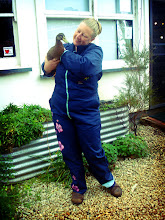In return for the sponsorship and support
of Permaculture Melbourne and people of the Upwey community to enable me to
attend Dave Jacke's Edible Forest Garden Intensive at Milkwood Permaculture I
am offering free workshops.
Two day workshop in Upwey on the 20th and 21st of July
Saturday 20th 10am to 5pm
Sunday 21st 11.45 to 5pm
We will start following Permaculture
breakfast at Magpie Cafe - 10.30 to 11.30am.
Location is to be announced.
You must be an "Upwey or
surrounds" local to attend this workshop.
Please contact me for info or registration:
Tamara@moonrisepermaculture.com.au
If you can't make these dates please
contact me anyway and I will let you know when I am running these workshops for
other groups. All Upwey and surrounds people will be free. If the response is
too large I will run another lot of workshops later in the year.
Texts: "Edible Forest Gardens"
Volume One and Two by Dave Jacke
If you have these books please bring them.
My volumes will be available on the day. You can probably share someone's book
if you don't have a copy. The cheapest place for these books is Amazon or
you can purchase them from Dave Jacke direct at: http://www.edibleforestgardens.com/about_book
Two Day workshop: Theory and Implementation
Theory:
- Permaculture, Ecology and Forest mimics
- Understanding forest dynamics and succession
- Resource sharing guilds
- Mutual support guilds
- Edible Forest Garden Pattern Language
- Site Analysis and Assessment
- Edible Forest Garden design basics
- Patch Design using the matrices in Volume 2 of "Edible Forest Gardens"
- Coppice crops
- How Australian EFGs must differ from examples in the UK and USA
Action:
- Implement an Edible Forest Garden design at a public place in Upwey with donated plants (please let me know if you would like to donate plants by 15th July so I can design them in)
These are the first of many forest garden
workshops in Upwey. These classes will well and truly get you started, but as
people get acquainted with Forest Gardening and have specific areas of interest
I can run more workshops and possibly an EFG book reading club.
Read how Dave Jacke explains forest gardens
here:
Make sure you check out Angelo Eliades'
Melbourne demonstration EFG at his website:
Angelo has created a huge resource for
budding permaculturists and Forest Gardeners.
Angelo runs excellent tours of his garden
and speaks eloquently about it and many other topics.
Other upcoming courses:
- Introduction to Edible Forest Gardening at "Upwey Townies" Monday 15th July from 6pm, Upwey Township Hall
- Permaculture Design Course (PDC) with Tamara Griffiths and Taj "The Perma Pixie" runs Wednesday evenings from 10th July until December email Taj: thepermapixie@gmail.com
- Permaculture Design Intensive, this post-PDC course runs 5 weeks, October and November
- register your interest with Taj: thepermapixie@gmail.com
- Understanding and improving soil with Taj "The Perma Pixie" August and September email Taj: thepermapixie@gmail.com
- Spring Wildfoods workshop with Taj "The Perma Pixie" Sunday 6th October, Thornbury email Taj: thepermapixie@gmail.com
Tamara Griffiths
Moonrise Permaculture
Tamara@moonrisepermaculture.com.au
0407 45 7707



